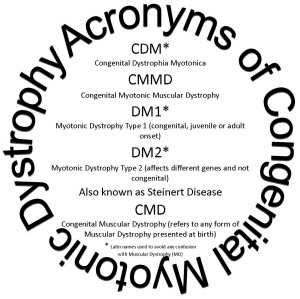Research is a big part of what we are involved in. Scientific knowledge is the stepping stone to understanding this disease.
Cure DM facilitate research in many ways:
* We attend conferences, advocating for our community and ensuring the myotonic dystrophy patient and carer is represented.
* We ensure any and all the information we share is accurate and correct - and up to date!
* We are on multiple panels and collaborate to publish documents and disseminate info.
* We directly support and fund researchers and clinicians.
* We take the patients perspective to those working on studies and researching this complex condition. We remind them that we are real people, and advocate on behalf of the DM community at every opportunity.
It is vital we continue to learn about Myotonic Dystrophy, particularly congenital and early childhood onset, and how it affects our children and loved ones. We aim to make this information common knowledge, and try to find treatments. Congenital DM is the most severe form of DM1 and is very much under represented.
No two people are affected in the same way, no two children present with the same symptoms.
This page will have updates on research.


Disclaimer:
"This site is owned and operated by CureDM, which is a registered charity. Nothing contained in this site is or should be considered, or used as a substitute for medical advice, diagnosis or treatment. The site owners and administrators cannot accept any legal or personal liability for the outcomes of actions taken by you in using this information. This site and its information do not constitute the practice of any medical, nursing, registered dietitian or nutritionist, or other professional health care advice, diagnosis or treatment.
All items and articles are written by individual authors. The opinions expressed are entirely the authors' own, except where clearly indicated. We strongly advise you to speak with a medical professional about all aspects of the condition."